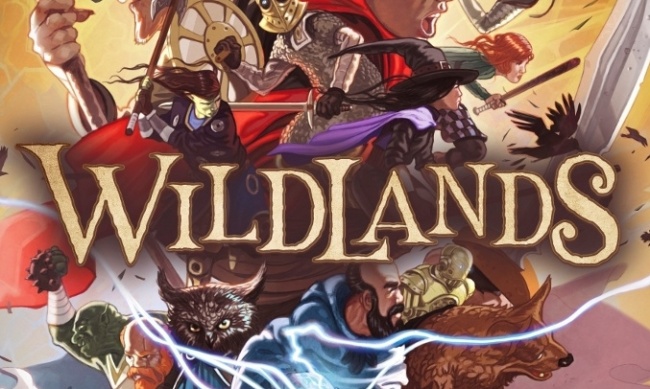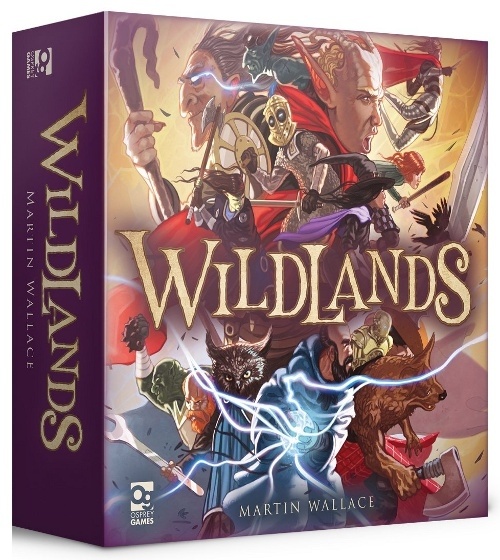Wildlands
Publisher: Osprey Games
Release Date: October, 2018
Price: $80.00
Game Designer: Martin Wallace
Format: Board Game
Number of Players: 2-4 players
Playing Time: 30-60 minutes
ISBN: 9-781-4728-2695-4
Age Rating: 14+
ICv2 Rating: 4 Stars out of 5
Martin Wallace has a large following as a game designer, and it is well-deserved. With each game, an odd new mechanic is presented, to delight and baffle players. In this one, it’s an odd take on using cards to control the actions of the character figures on the board. Most cards in each players deck can be used in multiple ways, depending on the character being used. Some cards cannot be used by some players, and a card that lets one character move or fight may only let another character move, or not even that. The icons on the cards are very clear and simple, and each one makes clear what actions a card can be used for by each character. Their use can still be complex, especially when the player wants to do anything complicated or surprising. Still, you never have more than seven to work with, and typically draw no more than three per turn, so players have to be careful in using cards.
The board itself is two-sided and beautifully illustrated, representing indoor and outdoor settings. The two sides have slightly different rules for movement, since the outdoor side also has elevation differences. The price of the game is partly due to the miniature figures included, as well as other components, but still may be considered a bit expensive for the quantity and quality of what is in the box. In the review copy received, one of the figures had no head, which doesn’t interfere with play but suggests a quality control error. For a board game with only 20 miniatures, a two-sided board and a bunch of cards, $80 is high enough to discourage gamers on a tight budget, but the game is a visual treat, and fun to play.
The game itself is based on winning by a combination of victory conditions. Players receive points for gathering crystals, but also for killing opponents. The different player factions [5 characters each in the basic set, 6 in the undead expansion] have their own strengths and weaknesses, and the starting setup for play is complex. You choose where your character figures will come into play, and choosing when is a tactical decision, but the person next to you decides where your crystals will be. Since you can only retrieve your own crystals for victory points, this is crucial. The more moving you have to do in order to get a character to a crystal, the more difficult it will be to retrieve. Each move requires expending a card, and picking up the crystal costs three cards, each of the correct type for the character doing the pickup. In typical Martin Wallace fashion, this is trickier than it sounds, but the game moves very quickly. The game’s suggested playing time of 30-60 minutes is optimistic, because the shorter time would require a very lucky start position, but 60 minutes of actual playing time is about right. Teaching the rules is simple, but setting up the board takes a few minutes, as players have to make decisions without quite knowing what they’re doing, even after they’ve learned the rules. That is because of the "blind" positioning of the crystals each player wants to retrieve, which isn’t revealed until after you determine your character starting positions.
There are four factions included in the basic game, and the planned expansions each include a new faction. Each of the factions is different, with wildly different abilities that seem very balanced in play. The first of these expansions, featuring The Undead, is odd, adding both a player faction and a new option for NPC monsters. The latter use of these affects the game more, since it gives players an extra reason to avoid combat, since killing a player character results in an undead arising in that spot. This creates potential for a quick revenge on the character who did the killing, if they’re in range. The option for using the undead as a separate faction is interesting, because they use different rules for taking actions and obtaining crystals. Another expansion is planned for early 2019.
The figures are complex and interesting enough to attract players who like painting miniatures. Some raise interesting issues, like "what DO you call a female minotaur," but they’re still great figures.
The play of the game is quick, about an hour once players have learned the mechanics, and if no one gets lucky… and that is the main weakness. Anyone who does get lucky, in terms of the starting position of crystals vs. characters, has a large advantage that could decide the game. Players who lose due to such a fluke will not be happy. On the other hand, there are many tactical decisions to make during the game, in terms of when and how to play cards, and for what effect. The same cards that are needed in order to pick up crystals are used to fight or defend, and you rarely have too many of them. If you’ve had to defend yourself during a turn, then you will probably be short on your own turn, and perhaps beyond that, as you are limited in your card draws.
Also, while it is possible to play with only two players, the openness of the board in that format may exaggerate the luck factor in positioning. The game seems to play better with at least three factions in play.
The game is complex enough that the suggested age range is probably correct. Best suited to game groups of 3-4 players who like challenging fantasy games.
--Nick Smith: Library Technician, Community Services, for the Pasadena Public Library in California.

ICv2 Stars: 4 (out of 5)
Posted by Nick Smith on December 1, 2018 @ 1:07 am CT



